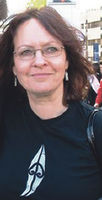After a year and a half of preparation and negotiation, the karanga or Maori call has finally been introduced into liturgies at Ss Peter and Paul Parish, Lower Hutt.
 The karanga’s introduction coincided with Maori language week at the end of July. The karanga is used at the elevation of the host and the chalice to honour the Maori language, and incorporate biculturalism into the parish following synod recommendations that Maori culture play a significant role in Masses in the archdiocese by 2011.
The karanga’s introduction coincided with Maori language week at the end of July. The karanga is used at the elevation of the host and the chalice to honour the Maori language, and incorporate biculturalism into the parish following synod recommendations that Maori culture play a significant role in Masses in the archdiocese by 2011.
The parish liturgy committee, leadership team, council and parish groups have been working to discern the steps towards inculturation of liturgy. Chrissie Locke, Ngati Whakaue Te Arawa, led two training sessions in the karanga for eager parishioners. Kelly Renata also played an important role in ensuring that the call is culturally acceptable to the Maori community.
The karanga takes the place of the traditional ringing of the bells at consecration. The caller rises to proclaim the call: ‘Haere mai e Hehu e… ou tinana e noho e huna nei i roto i tenei taro e…’ The response spoken by the congregation is then: ‘Nau mai, haere mai’. The call translates: ‘Welcome Christ, your body concealed within this bread’. The priest then replies, followed by the caller then singing: ‘Haere mai e Hehu e. ou toto e noho e huna nei i roto i tenei waina e.’ (Welcome Christ, your blood concealed within this wine) and the congregation answers as before.
The incorporation of the karanga acknowledges the Maori language and the country’s cultural heritage at this significant part of service. ‘Our Maori population is what makes us different from other nations, and this should be honoured.’
Chrissie Locke explains the significance of the karanga saying ‘it reaffirms who I am, and every time I do the karanga I feel privileged that I can. It reminds me of where I come from and I think of those who have gone before me’.